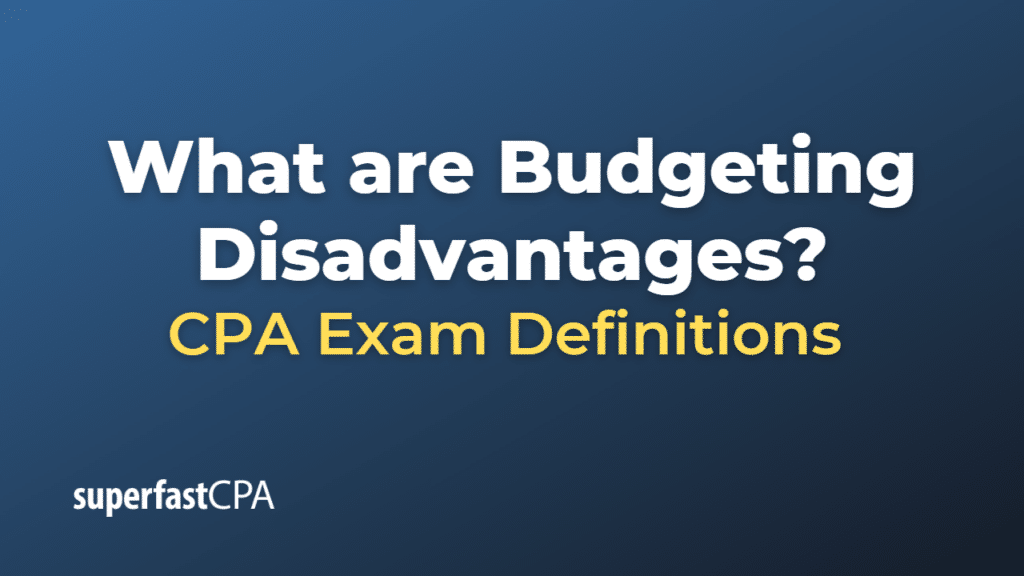Budgeting Disadvantages
While budgeting offers numerous benefits, there are some disadvantages as well:
- Time-consuming: The process of creating and maintaining a budget can be time-consuming, particularly for complex organizations. Gathering data, analyzing historical trends, and forecasting future performance requires significant effort, and the time spent on budgeting could be allocated to other tasks.
- Rigidity: Budgets can sometimes be inflexible, making it difficult to adapt to unforeseen changes in the business environment. Strict adherence to a budget may lead to missed opportunities or inefficiencies when circumstances change unexpectedly.
- Short-term focus: Budgets are often created for a specific period, usually a year or a quarter. This short-term focus might lead to an overemphasis on meeting short-term goals, potentially sacrificing long-term growth and strategic initiatives.
- Inaccurate forecasts: Budgets are based on forecasts and assumptions about future revenues, expenses, and market conditions. However, these forecasts may be inaccurate, particularly in volatile or rapidly changing industries. This can result in a budget that is not representative of the actual financial situation.
- Potential for manipulation: Budgets can sometimes be manipulated by management to present a more favorable financial picture, either to meet performance targets or to secure funding. This can lead to unrealistic expectations and poor decision-making.
- Bureaucracy: The budgeting process can become bureaucratic and complex, particularly in large organizations. This can result in lengthy approval processes, delays, and a lack of flexibility in responding to changes.
- Conflicting goals: Different departments within an organization may have competing goals, which can lead to budgetary conflicts. For instance, one department may want to increase spending to boost sales, while another may aim to cut costs to improve the bottom line. This can make it challenging to create a budget that satisfies all stakeholders.
Despite these disadvantages, budgeting remains an essential tool for managing finances, planning, and evaluating performance. To mitigate these drawbacks, businesses can adopt flexible budgeting approaches, regularly review and update their budgets, and maintain a focus on long-term strategic goals.
Example of Budgeting Disadvantages
Let’s consider a fictional small business, “ABC Bakery,” to illustrate the disadvantages of budgeting.
- Time-consuming: ABC Bakery’s owner, Sarah, spends a significant amount of time gathering historical data and forecasting sales and expenses for the next year. This leaves her with less time to focus on daily operations, employee management, and other critical aspects of the business.
- Rigidity: Sarah has set a strict budget for her bakery. However, halfway through the year, she identifies an opportunity to purchase a new type of oven that would significantly improve efficiency and product quality. Because the oven was not included in the initial budget, Sarah hesitates to make the investment, missing out on potential long-term benefits.
- Short-term focus: To meet the budget’s profit target, Sarah cuts back on marketing expenses. While this helps achieve short-term profit goals, it may negatively impact the bakery’s long-term growth by limiting its visibility to potential customers.
- Inaccurate forecasts: Sarah based her budget on an assumption that the local economy would remain stable. However, an unexpected economic downturn leads to a decrease in sales, rendering her revenue projections inaccurate.
- Potential for manipulation: To secure a loan for business expansion, Sarah may be tempted to inflate the bakery’s projected sales in the budget to present a more favorable financial picture to the bank.
- Bureaucracy: As the bakery grows, Sarah hires more employees and creates separate departments for production, sales, and administration. The budgeting process becomes more complex, and coordinating budget approvals between departments causes delays.
- Conflicting goals: The sales department at ABC Bakery wants to increase their advertising budget to attract more customers, while the administration department wants to cut costs by reducing employee benefits. This leads to tension and conflict during the budgeting process, making it challenging for Sarah to balance the needs of different departments.
This example illustrates some of the potential disadvantages of budgeting for a small business. However, it’s important to remember that budgeting remains an essential tool for managing finances and planning for the future. The key is to implement flexible budgeting practices and maintain a long-term strategic focus.













